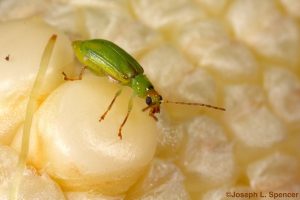New for 2021: Join the Corn Rootworm Adult Monitoring Network in Illinois (Updated contact information)
Nick Seiter, Joseph Spencer, and Kelly Estes
Update: please email nseiter@illinois.edu if you are interested in participating in this effort.

Are you interested in learning more about the corn rootworm populations in your field? Have you seen more northern corn rootworm adults over the last few years? Our
colleagues Dr. Erin Hodgson and Ashley Dean at Iowa State began a volunteer-driven corn rootworm monitoring network in Iowa last year, and we are cooperating with them to bring this effort to Illinois in 2021. Corn rootworms are our most serious insect pest in corn, and populations have crept up for the last several years in northern Illinois. This coincides with increasing reports of resistance to Bt traits, and more observations of northern corn rootworm. We hope to monitor these trends to provide better management recommendations to Illinois farmers and observe regional changes in western and northern corn rootworm populations.
To help get a more complete picture of rootworm trends in our state and region, we are asking for volunteers to monitor sticky traps this summer. We will provide the traps and instructions, compile data, and report findings later this summer; our volunteers will place a line of traps in a corn or soybean field and send us the counts.
Want to be a volunteer trapper?
If you are interested in volunteering to set up and monitor traps for corn rootworm or would like additional information, send an email to nseiter@illinois.edu by June 25, 2021. Please include your contact information and mailing address in the email. As part of the Illinois corn rootworm monitoring network, we will provide enough traps for each cooperator to monitor one transect (four traps) for four weeks. If a cooperator is interested in continuing to monitor after the four weeks is up or wants to place more traps in their field, additional traps may be purchased from several retailers. We purchased unbaited Trécé Pherocon AM traps from Great Lakes IPM for this project.
Traps and a protocol will be mailed to you in late June/early July. It can take over a month for the emergence of adult corn rootworms to be complete, depending on degree day accumulation, but we will aim to capture peak emergence through our network. Trapping will likely begin during the second or third week of July.
How can this help farmers?

Aside from providing a statewide and regional picture of corn rootworm trends, we hope these traps can provide volunteers with insight for their own fields that can be used for
management decisions. High adult activity may be concerning and indicate issues for the following growing season. The action threshold for adult corn rootworm in continuous corn is two beetles per sticky trap per day (1.5 beetles per trap per day when trapping soybean that will be rotated to corn), regardless of species. (Note that if you wish to use this primarily as a field-specific decision-aid, we recommend including additional lines of traps).
Taking things further
This year, we have partnered with extension and industry personnel in several U.S. states and Canadian provinces to synchronize our data collection efforts and provide a regional perspective on corn rootworm activity. Part of this partnership presents the opportunity for our cooperators to enter their data into an online database called Survey123. This will be an app-based data entry system that cooperators can use for free without creating an account. It will allow cooperators the autonomy of entering their own data, and these data will be used for live mapping of reports that will be publicly available on a webpage. We will make sure your privacy is protected. More information on Survey123 will be provided via email in late June, and you can opt in at that time.
Cooperators will not be obligated to use the application to enter data; alternatively, you are welcome to email your counts to nseiter@illinois.edu.
Contact: Nick Seiter, Field Crop Entomologist | nseiter@illinois.edu | (812) 593-4317





